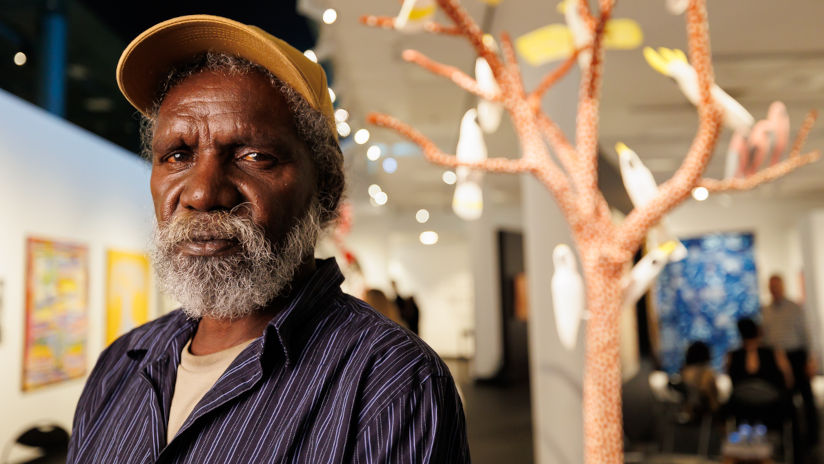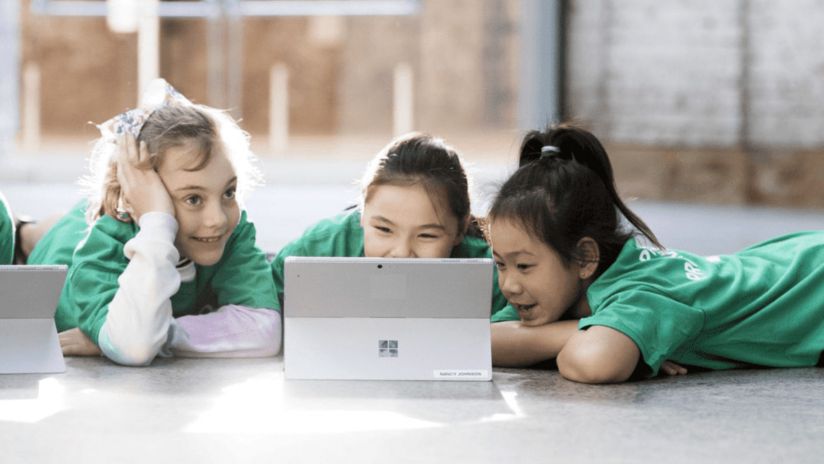Sparking First Nations connection in innovative virtual classrooms

Image credits: Big hART
The challenge
How can we use arts education as an opportunity to help students better connect with Aboriginal and Torres Strait Islander histories and culture – and enable teachers with resources built upon the work of young First Nations artists?
The outcome
A groundbreaking, cross-curricular, virtual classroom-based education unit, that is empowering primary school teachers to feel much more culturally competent in the delivery of First Nations arts content.
NEO-Learning initiative from Big hART
It begins with Big hART – an arts organisation driving social change. For over a decade it has offered an outlet for young Aboriginal people in Roebourne – a former gold rush town in the Pilbara – encouraging them to express themselves through innovative digital forms of creativity.
NEO-Learning is a Big hART initiative that builds on this incredible legacy in Roebourne and takes it to the world (well, to Australian primary schools, for now) in the form of groundbreaking digital arts education.
Propelled at pace by their participation in the Telstra Foundation’s Tech4Good Challenge accelerator, Mark Leahy and April Phillips are the duo steering NEO-Learning’s course; he is a musician and she is an educator. Initially Mark was leading and managing the project more-or-less on his own. It wasn’t long before he realised he needed someone who knew their way around the education sector and the curriculum, and someone who had empathy for teachers and students. In April he found that person and also someone innately passionate about both digital methods of education and First Nations culture (she is a Wiradjuri-Scottish woman). Together, Mark and April – backed by a tight cohort of supportive specialists as well as experts from Telstra – have formed a formidable team.
In contrast to the typical product development trajectory, which puts all energies toward the launch of an MVP, NEO-Learning has truly been in ‘permanent beta’. From the sketchiest initial version of a lesson plan, the team have delivered lessons, taken feedback on board and iterated their methods in time for the next classroom. NEO-Learning has been constantly learning-whilst-doing and making improvements week-by-week.
Perfection and winning doesn’t feel like the goal, it’s about learning, understanding, adapting and building a keen focus on users.
– April Phillips, NEO-Learning
So, what have they learnt? The first was about the use of technology in classrooms. As Mark and April took their pilot to different schools, they saw that their ideas of using high-tech interfaces to deliver digital arts education were going to be challenged by available technologies. Instead of forcing their way forward with a lowest-common-denominator technology, they took a more pragmatic approach. If a school did not have tablets, they would use desktop computers. If there weren’t enough desktop computers, then they made it work with pens and paper.
Another key insight along the way was ensuring the content was designed for the teachers as much as for the students. With every session that was rolled out, Mark and April encountered teachers feeling the pressure of cross-curricular priorities, unfamiliar with digital arts as subject matter and under-confident with their cultural competency. They felt neither safe nor empowered to deliver the content on their own.
Perhaps Mark and April’s most important realisation across their journey was that the success of NEO-Learning hinged less on the content and more on how it was delivered. The more they trialed their approach, the more they found themselves focusing on the nuances of delivery. To further support teachers the team moved to an online virtual classroom approach in which lessons were delivered by virtual educators. A punchy 1hr lesson duration was trialed initially but did not provide enough time for the students to deeply engage, so they extended the session duration.
NEO-Learning now has a clearly defined shape and form. It’s a unit of learning delivered to Primary school years 3–6 across 3 weeks and 3.5 contact hours. Facilitation via an online virtual classroom means it is already geared for national roll-out. Whilst its content is anchored in digital arts and culture, it ticks multiple cross-curricular boxes, including literacy, numeracy, science, arts, design & technology, geography, and health.
Through sheer effort and continuous iteration, NEO-Learning is now gaining traction and making an impact. 1,015 students have taken part in the pilot so far, with perfect attendance from teachers across lessons and workshops. Cultural connections have been forged, with 89% of classes now adding Aboriginal words to their weekly spelling lists. Inroads are being made on digital literacy. From limited experiences of live virtual learning, every school has now participated in a virtual classroom experience. From 97% of teachers having limited skills in digital drawing, the program is steadily winding this number back with every session.
Further impact will come from NEO-Learning’s next moves. More continuous student and teacher touchpoints will create ongoing engagement; new units of learning and self-service toolkits will be added; a podcast hosted by artists from Roebourne’s digital lab is also in the works.
I wanted to thank you again for the part you are both playing in the education of my students. Many of them have not met an Aboriginal person before, so in a very real way you are changing the world 1 person at a time.
- Teacher, South Australia
We now circle back to where it started, in Roebourne. The impact of NEO-Learning has been felt keenly here too. The young people of the Pilbara have seen their art amplified, championed and recognised. Through ongoing digital art workshops they continue to express themselves and their culture, learn new skills and gain feelings of pride, belonging and security. NEO-Learning’s work started here and will always come back here.


